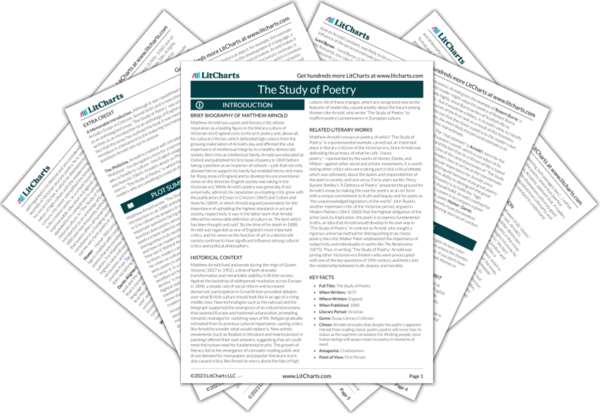Alongside his distinction between truly “classic” poetry and poetry of a lesser rank, Arnold’s argument relies on another, subtler distinction between reason and emotion—which he equates in the essay with prose and poetry, respectively. Arnold begins his essay by declaring that, in a world increasingly devoted to “the fact,” poetry is destined to be the supreme source of comfort and culture for modern people. In this way, Arnold implies a dichotomy between reason and emotional experience, which is the realm of poetry. This dichotomy runs throughout the essay, from Arnold’s argument that “science will appear incomplete” without poetry to his final claim that people will return to poetry not by “deliberate and conscious choice” (reason) but “by something far deeper” (an emotional need). This distinction comes out most clearly in Arnold’s discussion of John Dryden, whom he calls “the inaugurator of an age of prose and reason.” Dryden, in Arnold’s view, cannot be considered a “classic” poet because he emerged from a culture that valued prose’s “regularity, uniformity, precision, balance” more than poetry’s “largeness, freedom, insight, benignity”—qualities that, according to Arnold, are lacking from Dryden’s verse. In this way, Dryden can be said to embody the dichotomy that Arnold relies on in “The Study of Poetry”: though he “may in a certain sense be [a] master of the art of versification,” which is to say of poetry’s rational side, his poems lack the emotional scope that Arnold sees as integral to poetry of the highest rank.
Reason vs. Emotion ThemeTracker

Reason vs. Emotion Quotes in The Study of Poetry
More and more mankind will discover that we have to turn to poetry to interpret life for us, to console us, to sustain us. Without poetry, our science will appear incomplete; and most of what now passes with us for religion and philosophy will be replaced by poetry. Science, I say, will appear incomplete without it. For finely and truly does Wordsworth call poetry ‘the impassioned expression which is in the countenance of all science.’
A fit prose was a necessity; but it was impossible that a fit prose should establish itself among us without some touch of frost to the imaginative life of the soul. The needful qualities for a fit prose are regularity, uniformity, precision, balance… But an almost exclusive attention to these qualities involves some repression and silencing of poetry.











